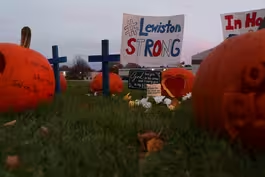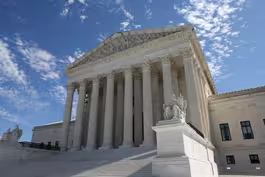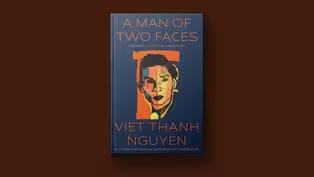
Students protest WVU cuts targeting academic programs, jobs
Clip: 10/31/2023 | 9m 11sVideo has Closed Captions
Students protest West Virginia Univ. budget cuts targeting academic programs and jobs
West Virginia University made headlines in the world of higher education this year when it announced it was making major cuts to some academic programs and faculty. There's concern about whether other public universities may follow suit. Special correspondent Hari Sreenivasan has reports for our series, Rethinking College.
Problems playing video? | Closed Captioning Feedback
Problems playing video? | Closed Captioning Feedback
Major corporate funding for the PBS News Hour is provided by BDO, BNSF, Consumer Cellular, American Cruise Lines, and Raymond James. Funding for the PBS NewsHour Weekend is provided by...

Students protest WVU cuts targeting academic programs, jobs
Clip: 10/31/2023 | 9m 11sVideo has Closed Captions
West Virginia University made headlines in the world of higher education this year when it announced it was making major cuts to some academic programs and faculty. There's concern about whether other public universities may follow suit. Special correspondent Hari Sreenivasan has reports for our series, Rethinking College.
Problems playing video? | Closed Captioning Feedback
How to Watch PBS News Hour
PBS News Hour is available to stream on pbs.org and the free PBS App, available on iPhone, Apple TV, Android TV, Android smartphones, Amazon Fire TV, Amazon Fire Tablet, Roku, Samsung Smart TV, and Vizio.
Providing Support for PBS.org
Learn Moreabout PBS online sponsorshipGEOFF BENNETT: West Virginia University made headlines in the world of higher education this year when it announced it was making major cuts to some academic programs and faculty.
And there's concern about whether other public universities may follow suit.
Special correspondent Hari Sreenivasan has the story from Morgantown, West Virginia, for our series, Rethinking College.
HARI SREENIVASAN: On-campus protests over social issues can be a typical part of the college experience, but these West Virginia University students are protesting for a different reason.
They're speaking out against the budget cuts their university has made.
PROTESTER: What do we say Gordon Gee?
HARI SREENIVASAN: It's part of their ongoing fight against the elimination of programs by West Virginia University President Gordon Gee.
Tucked into the foothills of the Appalachian Basin, the state's largest university is home to more than 24,000 students.
The school's long-serving president announced the cuts this summer.
On the chopping block, almost 8 percent of its majors and up to 5 percent of its faculty positions.
Among the majors eliminated, biometric engineering systems and almost all foreign languages, though there will be a few classes remaining in Spanish, French, Arabic, and Chinese as electives.
FELICIA CARRARA, College Student: All of this change is kind of scary.
HARI SREENIVASAN: The school's decisions have left students like Felicia Carrara, who is majoring in international and Russian studies, in limbo and unsure of the future.
FELICIA CARRARA: I thought that, when I chose my college, I would have a pretty set path for four or five years, and that after, I would be able to figure things out, of course, but I would have a degree under my belt.
HARI SREENIVASAN: President Gee first ran the land-grant university from 1981 to 1985.
Under the Morrill Act of 1882, states were given federally controlled land to create colleges.
They offered research and educational opportunities to people in the state, especially those in rural areas.
Over time, many of the original schools became large public universities, like West Virginia.
Gee says that, when he returned for a second term, he wanted the school to keep pace with where he thinks the future of education is headed.
GORDON GEE, President, West Virginia University: When I came back, I could see that was going -- there were starting to be some fundamental changes.
We started on the non-academic side, hired McKinsey, asked them to tell me, how could I change the university in order to impact the state?
HARI SREENIVASAN: So, you're looking at cutting, I want to say, 32 majors, 169 faculty.
GORDON GEE: I'm counting on it being enough.
Actually, due to retirements and a variety of other things, it's going to be about 70 faculty.
We will still be one of the most comprehensive, robust universities in the country with well over 300 majors.
HARI SREENIVASAN: What was the decision criteria?
Which department, or... GORDON GEE: We based it on facts.
And the fact was, if you have a large number of faculty members teaching few students, that's where you start off.
If students are not graduating and getting good jobs, that's one of the things you take a look at.
HARI SREENIVASAN: Critics say the rollout of cuts has been messy and confusing.
JONAH KATZ, West Virginia University You will basically choose two more classes from the whole menu.
HARI SREENIVASAN: Jonah Katz met with this student for the first time to tell her he cannot be her adviser.
She came from Spain in August.
JONAH KATZ: The week that she arrived here, she found out that the department is likely to be eliminated.
HARI SREENIVASAN: Katz is an associate professor with tenure at West Virginia University.
His job was cut.
JONAH KATZ: The provost's office has settled on eliminating my department and the program in which I teach.
HARI SREENIVASAN: What do you think the impact of these cuts will be to the university?
JONAH KATZ: I think the level of reputational damage that the university is going to take will not be survivable.
I don't think that this will be a viable research university in five to 10 years.
And it essentially means that there's no real tenure here anymore.
And so nobody is going to come teach here unless they have absolutely no other choice.
HARI SREENIVASAN: Since the announcement of cuts, dozens of faculty and students have protested the university's decision to eliminate certain programs.
And, in early September, the faculty voted to pass a no-confidence resolution in Gee's leadership, calling for the budget cut process to be frozen.
You got a huge no-confidence vote from the faculty just recently.
GORDON GEE: I got a third of them.
If you're a university president right now, everyone's getting no-confidence votes, because it's a tough environment.
HARI SREENIVASAN: One of the main issues confronting the university, a $45 million deficit.
Gee says the school lost revenue due to the pandemic and declining enrollment.
But students and faculty believe he spent money on projects which ultimately don't benefit the school.
Everybody is looking at this shortfall now.
They're saying, hey, Mr. President, why did you spend $100 million on the business school or another $40 million on football team-building?
GORDON GEE: The answer to that is the fact that we have invested wisely, I think.
You know, people will say, well, gee, you know, you had overextended or over-budgeted.
But the reality is this.
We've spent about $300 million in capital projects.
Our business school is one of our great growing areas.
And we wanted to invest in it.
And, you know, we raise a lot of private money for that.
HARI SREENIVASAN: Where the cuts are concerned, Gee says they are necessary to ensure future growth.
GORDON GEE: We're cutting back in order to pour money in.
That's the whole point.
We're making the kind of decisions that will allow us to be able to invest in the programs that we think are going to be essential for our institution.
HARI SREENIVASAN: What's the role of the state here?
GORDON GEE: I will say that, since I returned, that the state has been very supportive of our institution.
We've lost dollars because the whole state had to cut back.
HARI SREENIVASAN: Last year, West Virginia lawmakers changed how public colleges and universities are funded in the state, giving priority to majors in engineering, education, and information technology.
Many of the university's cuts approved by the board of governors last month reflect that.
So, what happens to public universities, especially in states like West Virginia?
If you really want that kind of liberal arts, want language arts, everything else, you have got to go somewhere else?
GORDON GEE: No, absolutely not.
Remember, I said we have over 300 academic programs.
No one needs to leave the state to get a great education, a great liberal arts, a great academic, a great science, a great STEM, a great medical education.
No one needs to leave the state.
HARI SREENIVASAN: How many of you are directly affected by the programs that are on the chopping block or being scaled back?
How many of you have to rethink what you're going to do to graduate?
The students in this room are part of the West Virginia United Students Union founded this July as a direct result of the cuts.
How many of you feel like the university is hearing your concerns?
Gee says his administration has been clear about the changes.
These students do not agree.
ANDREA RUPP, College Student: The thing about these cuts and the narrative proposed about how they are only affecting these small departments is that it is not the case, because the lack of transparency and sheer amount of cuts is decimating the trust that faculty has here.
This is not just affecting those small majors.
It's affecting everybody.
TAYA SULLIVAN, College Student: When I first came to this university, what I wanted to do was, I wanted to go to med school and, like, know Spanish so that I could treat patients in their native language.
And I, mean, I have kind of changed course completely there.
CHRISTIAN ROWE, College Student: I think that a lot of students are being forced into majors that have like a big paycheck waiting for them when they graduate, because tuition has gotten so high.
LISA CORRIGAN, University of Arkansas: What's happening at West Virginia, I think, is, sort of an atom bomb has gone off, and it's sort of slow moving.
It's something that's happening in much a smaller scale around the country.
HARI SREENIVASAN: Lisa Corrigan is a professor at the University of Arkansas who has written about West Virginia University.
She says other land-grant universities, like Texas A&M and the University of Utah, are making similar changes.
So, what do you think other schools are watching about how this all plays out?
LISA CORRIGAN: It depends on what kind of institution they are and what kind of state they're in, and some as a cautionary tale, and some as an opportunity.
And I think you're going to see a split happen, as other universities either follow in line with what he is doing and/or repudiate it completely.
HARI SREENIVASAN: Last week, in his state of the university address, President Gee outlined his vision for West Virginia University as a modern land-grant university, promising that, regardless of cuts, every student would be afforded a well-rounded education.
As for these students, they told us they plan to continue their fight.
MATTHEW KOLB, College Student: Something that the student union is trying to do is build student power.
HARI SREENIVASAN: If there is power in numbers, then these students are on the right path.
Since July, their group has grown to more than 400, they say, with more lining up to join.
For "PBS NewsHour," Hari Sreenivasan in Morgantown, West Virginia.
GEOFF BENNETT: You can watch more of the stories in our series Rethinking College on our Web site, PBS.org/NewsHour.
Alabama jail accused of mistreating pregnant detainees
Video has Closed Captions
Clip: 10/31/2023 | 6m 8s | Alabama jail accused of mistreating pregnant detainees, putting unborn children at risk (6m 8s)
Israeli airstrike hits refugee camp in northern Gaza
Video has Closed Captions
Clip: 10/31/2023 | 11m 56s | Israeli airstrike hits refugee camp in northern Gaza, killing and wounding civilians (11m 56s)
Maine gunman's family flagged behavior before shooting
Video has Closed Captions
Clip: 10/31/2023 | 6m 48s | Police scrutinized after revelations Maine shooter's family flagged his behavior (6m 48s)
Supreme Court takes on officials blocking online followers
Video has Closed Captions
Clip: 10/31/2023 | 6m 1s | Supreme Court takes on cases involving public officials blocking social media followers (6m 1s)
Viet Thanh Nguyen's memoir reflects on experience of war
Video has Closed Captions
Clip: 10/31/2023 | 7m 38s | Author Viet Thanh Nguyen's new memoir reflects on family's experience of war and exile (7m 38s)
Providing Support for PBS.org
Learn Moreabout PBS online sponsorshipSupport for PBS provided by:
Major corporate funding for the PBS News Hour is provided by BDO, BNSF, Consumer Cellular, American Cruise Lines, and Raymond James. Funding for the PBS NewsHour Weekend is provided by...
















